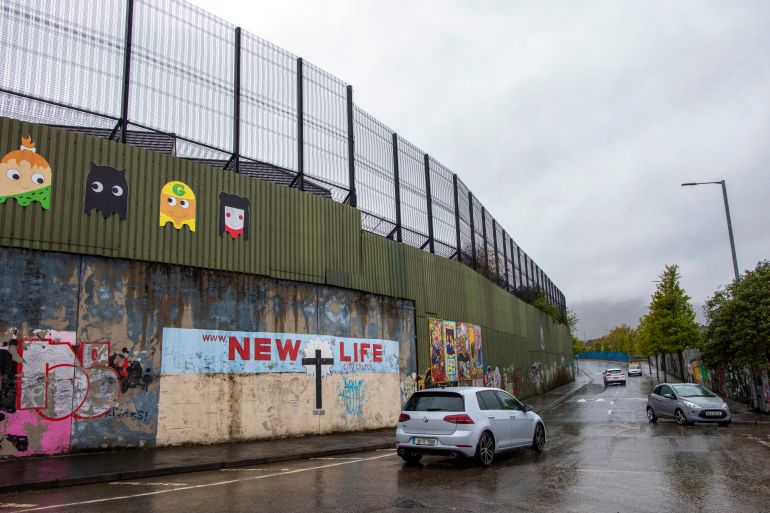Shifting demographics stirs debate on Northern Ireland’s future
New census figures show that Catholics outnumber Protestants in Northern Ireland for the first time ever.

For the first time in Northern Ireland’s history, new census figures show that Catholics outnumber Protestants.
The results have been described as “a seminal moment” by leaders of Irish republican parties – who favour the reunification of Ireland and draw most of their votes from the Catholic population, and have caused disquiet in unionist camps – who want to remain in the United Kingdom and are supported mostly by Protestants.
Keep reading
list of 4 itemsNorthern Ireland unionists hold parade amid political crisis
Queen Elizabeth remembered in Ireland for historic reconciliation
Viewing King Charles from British Empire’s first colony – Ireland
While most of the island of Ireland gained independence from the UK a century ago, Northern Ireland was carved out in a way which explicitly aimed to maintain a permanent majority of pro-British Protestants.
For some, the new figures are thus another sign on the pathway to a united Ireland.
John Finucane, a prominent member of the leading republican party Sinn Fein, called for preparations for the “possibility of a unity referendum”.
“The partition of Ireland has been a failure. We can build a better future together, for every person who lives on this island,” the MP said upon the announcement of the results.

Complex picture
However, caution is required when interpreting the results and their political applications, Peter McLoughlin, a senior lecturer in political history at Queens University Belfast, told Al Jazeera.
People from a Catholic background are not a majority of the total population, and nor do they all necessarily support a united Ireland.
“While we can say there is a very strong link between religion and political orientation, there are exceptions to the rule on both sides,” McLoughlin said.
Nonetheless, Northern Ireland’s history means that the fact that Catholics are now the larger group is clearly “symbolically and historically important” and will add to unrest among unionist political parties who have seen their position change in years.
In 2017, unionist parties lost their majority for the first time in the local legislature.
Earlier this year, Sinn Fein gained the largest number of seats in the May elections, the first time a republican party has managed to do so.
Another worrying trend for unionists is that the number of people who defined their identity as “British only” dropped by 8 percent since the last poll in 2011.
It was noticeable that both main unionist parties briefed the media to downplay the significance of the results before they were even announced.
What is clear is that unionists – or indeed, Irish republicans – will need to reach beyond those who identify as Catholic or British, Irish or British, in order to have enough support for their cause.

Middle ground
About one in five people identify as “Northern Irish” and may well support parties like Alliance, who do not take a stance on reunification and made significant gains in elections this May.
Kellie Armstrong, a representative of the Alliance party in the local legislature, told Al Jazeera that the census figures demonstrate that many people like her do not want to be “pigeonholed” as British or Irish.
“It just shows that we’re no longer a place of two parts, that we are actually a more pluralist and a much more diverse Northern Ireland,” she said.
Any referendum on Irish unity “will be a lot more nuanced and it will be people like myself, people who are Northern Irish, the people who have not defined themselves by religious terms, that will actually decide whether there should be a border poll [referendum], and what that border poll like outcome will be”, Armstrong said.
Growing diversity
The census also shows the small but growing part of the population who are from Black or minority ethnic backgrounds or have migrated to Northern Ireland from the EU and elsewhere.
Those from a minority ethnic background now make up 3.6 percent of the population – four times what it was in 2001 at the end of the 30-year armed conflict, and more than 100,000 people recorded their place of birth as outside of Northern Ireland.
While most people speak English, more people now speak Polish or Lithuanian than the indigenous languages, Irish or Ulster Scots.
However, a parliamentary inquiry from earlier this year found that politics is not keeping pace with this change, stating that “minority communities have often been overlooked in Northern Ireland”.
The report found that a perceived priority given to issues facing the main Catholic and Protestant communities means that this can “squeeze out” attention for minority ethnic and migrant communities, often seen as “other”.
Northern Ireland also grapples with disproportionately high levels of hate crime – where perpetrators are rarely brought to court.
Hate crime
The Belfast Multi-Cultural Association (BMCA) was fire-bombed in a hate crime attack in May, the day before they were due to reopen after a previous fire-bomb attack in 2021.
“Very often Black and ethnic minority communities are often left out of conversations”, said Coumilah Manjoo of the BCMA.
“The census data is significant, it shows that the population is now more diverse than ever, the languages we speak is more diverse.”
“Even with the census data, people seem to be far more interested with the ‘green and orange’ [Catholic and Protestant] side of things. We have to move beyond that rhetoric.”